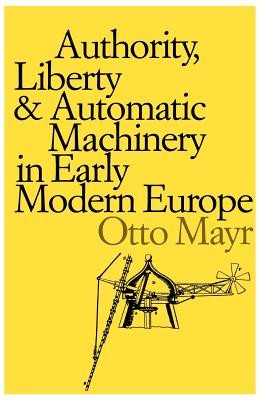
- We will send in 10–14 business days.
- Author: Otto Mayr
- Publisher: Johns Hopkins University Press
- ISBN-10: 0801839394
- ISBN-13: 9780801839399
- Format: 15.3 x 23.6 x 1.7 cm, softcover
- Language: English
- SAVE -10% with code: EXTRA
Authority, Liberty, and Automatic Machinery in Early Modern Europe (e-book) (used book) | bookbook.eu
Reviews
Description
Perhaps never in history has society been so fascinated with a single machine as when, in early modern Europe, the clock evolved into a major cultural image, widely used in literature, science, and especially Cartesian philosophy. Yet in England, there was greater interest in a different class of technology-the feedback device, such as the safety valve on a steam engine, that could control itself internally;self-regulating systems were hallmarks not only of practical technology but also of the abstract theories of Newton and Adam Smith.
Otto Mayr, the director of Germany's leading technological museum, explores the relationship between machinery, technological thought, and culture. Contrasting England and the Continent, particularly in the eighteenth century, he uncovers a stikring pattern of technological metaphors applied to political systems-and lays the foundations of a new intellectual history of technology
EXTRA 10 % discount with code: EXTRA
The promotion ends in 19d.21:18:17
The discount code is valid when purchasing from 10 €. Discounts do not stack.
- Author: Otto Mayr
- Publisher: Johns Hopkins University Press
- ISBN-10: 0801839394
- ISBN-13: 9780801839399
- Format: 15.3 x 23.6 x 1.7 cm, softcover
- Language: English English
Perhaps never in history has society been so fascinated with a single machine as when, in early modern Europe, the clock evolved into a major cultural image, widely used in literature, science, and especially Cartesian philosophy. Yet in England, there was greater interest in a different class of technology-the feedback device, such as the safety valve on a steam engine, that could control itself internally;self-regulating systems were hallmarks not only of practical technology but also of the abstract theories of Newton and Adam Smith.
Otto Mayr, the director of Germany's leading technological museum, explores the relationship between machinery, technological thought, and culture. Contrasting England and the Continent, particularly in the eighteenth century, he uncovers a stikring pattern of technological metaphors applied to political systems-and lays the foundations of a new intellectual history of technology


Reviews